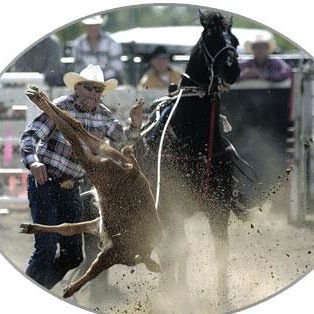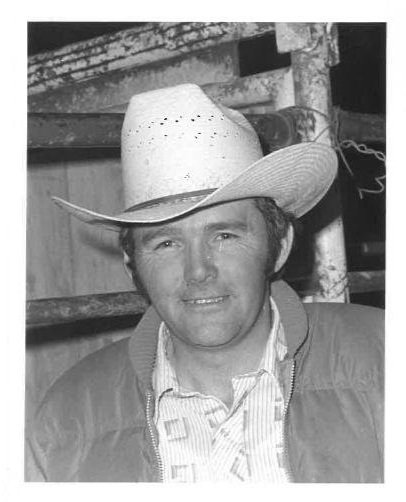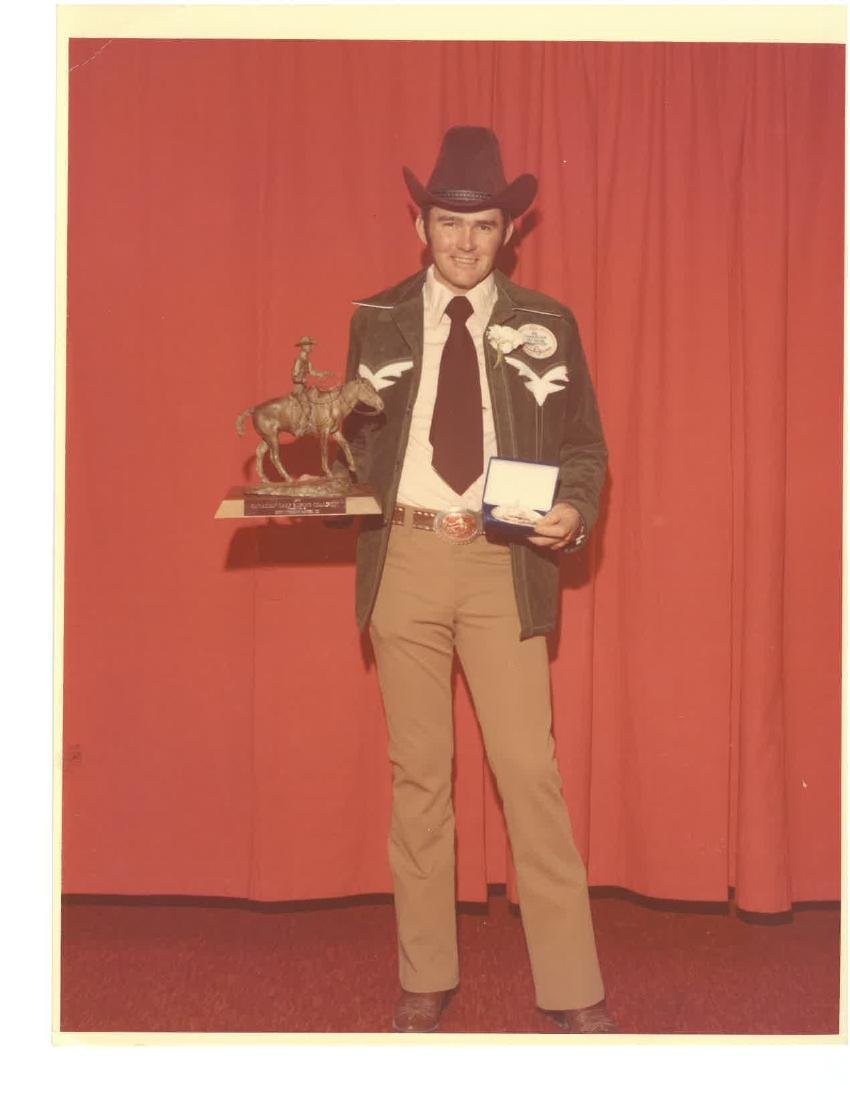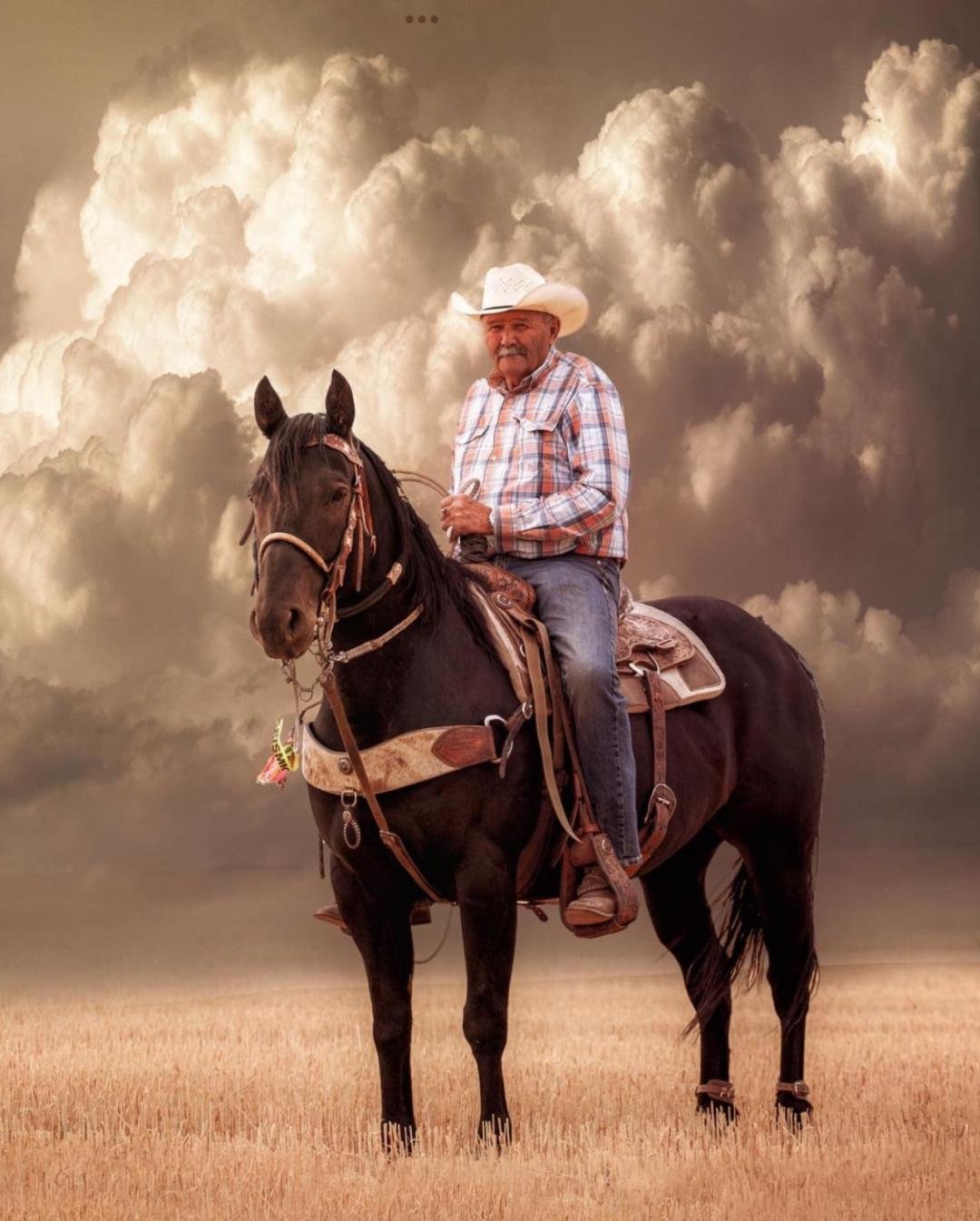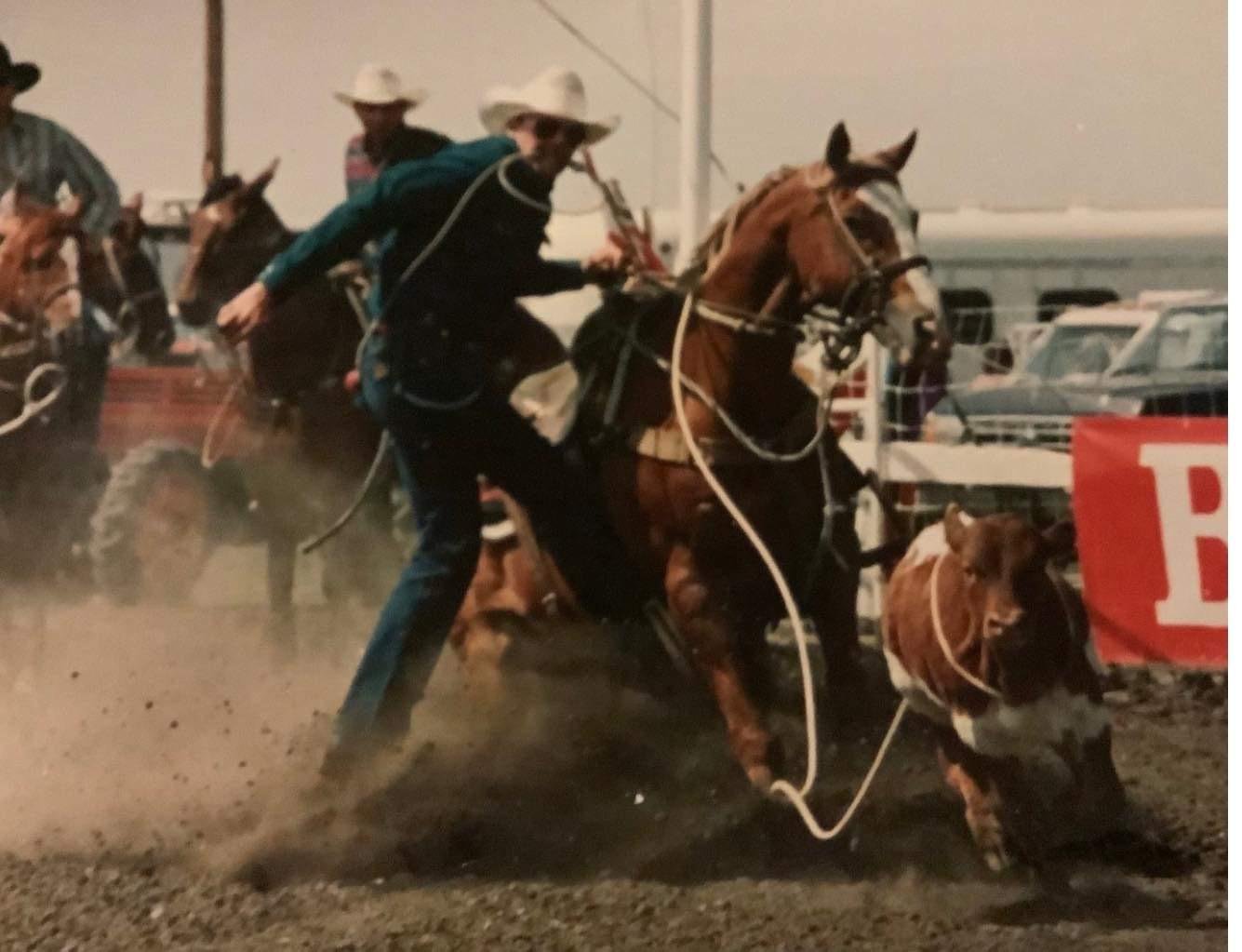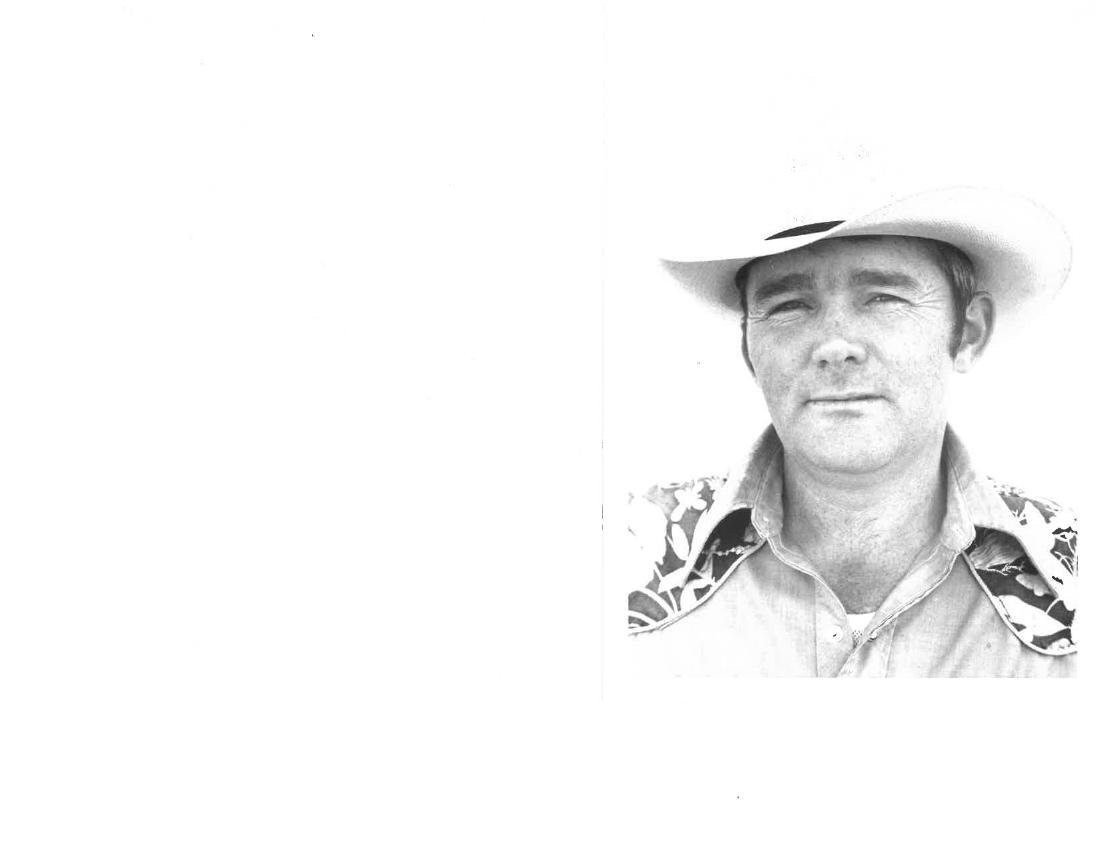When a contestant has won a Canadian Pro Rodeo Championship it’s considered quite an achievement, but when a horse he trained was also crowned with a Canadian title, that is a true testament to his all-around horsemanship abilities. The 1976 Canadian Calf Roping Champion Bill Reeder did just that and then locked in a trifecta by adding another horse to claim the honours twice more, qualified for the Canadian Finals Rodeo (CFR) eleven times and was entangled in the first ever Finals tie-breaker.
After turning pro in 1974, Bill qualified for the first Canadian Finals in his rookie year and tied for first place with Lorne Wells. This called for a tie-breaker where the decision was given to Lorne’s fastest times over Bill’s most money won. He then qualified for the Finals during ten consecutive years, one of only a few contestants to achieve this, coveting the title in 1976. Bill was once again Runner-Up in 1979 and 1982, as well as qualifying in 1988.
William Lynn Reeder was born July 7, 1945 and ranch raised in the scenic Rocky Mountain foothills, just outside of Cardston, Alberta, the town where his great grandparents settled at in the 1890s. His grandfather then homesteaded the Reeder Ranch, the same location Bill has ranched at for over fifty years with dedicated wife Pam, originally from Logan, Utah. Known as a high achiever, he didn’t just stumble into and fill his grandfather or father’s cowboy boots to take on the ranch manager job, he first received an education. He attended Lethbridge Community College, Utah State University and Montana State University resulting in a Degree in Business and a Bachelor Degree in Agriculture Production and Animal Sciences.
Once settled back at his roots, he began calf roping in Southern Alberta events winning the 1972 and 1973 Chinook Rodeo Association Calf Roping Titles. Eventually, he ventured on to the pro rodeo trail with some great mentors, “In the beginning I travelled with Bearman Campbell, now he was a character, and Jim Gladstone who (literally) showed me the ropes. Also, I was around two respected old-timers, Fred Gladstone and Charlie Ivins who gave me tips to try new ideas for improvement.” These new techniques paid off for Bill in 1974 by establishing a Canadian Calf Roping record with an 8.0 second run (tied with Kim Gripp) that held until 1979.
“One thing I found interesting, was I was right in the transition from the Harold Mandevilles with that old style of roping, then the Jimmy Gladstone and Lorne Wells to the Larry Robinson, Joe Lucas and Cliff Williamsons. It was an interesting time how we evolved and changed to be faster, by horses stopping harder and getting off the right side, instead of the traditional left.” He explained, “This gave you a quicker dismount and straighter line to the calf. Also, back when I started, there were a lot of guys that legged calves down instead of flanking them like they do now.”
Expanding his miles on the road by heading south of the border, Bill ended up 17th in the 1977 Professional Rodeo Cowboys Association World Standings. He claimed Pendleton Roundup as his all-time favourite rodeo, “It was a lot of fun and really brought the cowboy out of you with lots of different challenges. You came fast across that grass arena and really had to trust your horse.”
This enthusiastic cowboy wasn’t afraid to tackle anything new including testing his talents at the bucking end of the arena during his amateur years. Deciding to stay at the timed event side, he added steer wrestling and team roping to his repertoire. His biggest ‘show me the money’ win was at the 2014 World Series of Team Roping Finale, where he and partner Robert Heggie won $32,000 US. Bill was heeling then, not heading as most would assume a calf roper would naturally adapt to, and he explained his strategy, “I do both. I head when across the line because there are better heelers down there, but in Canada, I mostly choose to heel because there are less winning heelers up here. Also, I guess I got bitten by the challenges of heeling.”
Training horses was always one of Bill’s favourite past-times that started in his youth. “The only thing we had to play with was a horse. I could go anywhere and do anything bareback, because I didn’t even own a saddle back then. And there sure were no bicycles.” His equine talents evolved, eventually earning him three Canadian Calf Roping Horse of the Year titles, with his horse Yankee in 1980 and 1982 and Turbo in 1988.
He applied training skills to herding Border Collies for the family ranch that at one time had up to 1,400 head of sheep as well as 150 cows. “Everybody had mixed farming back in the day. In 1970, we had over 600 ewes so we built a long lambing barn that I converted into a roping arena during the down-time,” Bill recalled. “I began training Collies in the 1980s, because we needed a better calibre of herd dogs, that led to going into cattle dog competitions with them as well.”
He always preferred strapping leather on a fresh horse to dog training because the challenge was more satisfying bringing out a horse’s natural instincts and getting the best out of them. His favourite horse out of his string was Chileo who he won his 1976 Canadian Championship with, “He just did that little extra to help you win… I could feel it. Like when you were running a little early at the barrier, I could feel him pause so he wouldn’t break it. Or when a calf was kicking, he knew how to hold the head just right.” He also appreciated his horse Turbo, “He was a challenge to start but had a lot of try and ability. When you match the two qualities with a good mindset, then they just want to please you.” After Tie-Down Roper Marty Becker bought Turbo from Bill following the 1988 Calf Roping Horse of Year title, the horse went on to claim the accolades again in 1993.
He praised some old-school cowboy etiquette, “I remember Jimmy Gladstone helped me out with roping a lot and Wally Pugh suggested that I try a certain bit on a horse and it worked. That was back when friends put competition aside and really helped each other out.” Bill paid it forward by holding roping schools or private lessons to help upcoming young guns including some future champions. By setting an example through these encouraging acts of service, many of his peers respected this Christian Cowboy who proudly wore his faith like a trophy buckle. Humbly he commented on his beliefs, “Religion or lifestyle has helped me stay grounded. As cowboys, we can go off on tangents and get carried away and I guess after the hectic pace of the rodeo trail, it was nice to come back to the ranch and family where I was held accountable.”
Pam and children Lynette, Steve and Wade were always great supporters, whether helping in the practice pen or on the rodeo trail. As the main gate worker, calf un-tier, baby-toter or rodeo trail Uber, Pam testified to his character, “Bill is a man of integrity, ambition and determination. He has amazing patience with animals and has the ability to watch someone and help them correct any problems.” She added, “Our kids actually thanked him for teaching them work ethic. They watched him put in long hours of practice every day even roping up to 600 calves in a two-week period.”
Bill’s final reflection on his career was this, “Although a cowboy should always be prepared to win, one important trait is to also learn how to lose; to put it aside and move on.” Because he had a family to care for, he competed responsibly, which led to his only regret. “I should have gone for first place more often than taking the safest route to just place for a cheque. I could have won more rodeos, but not consistently won the money. First is out there to try and get, but Second was much more attainable.”
He credited years of solid horses and good health to winning, until in the spring of 2021, when Bill had a wreck unloading a ranchy cow at the veterinarian’s clinic, resulting in a broken femur that didn’t heal properly for 6 months. After two surgeries and a hip replacement, he finally felt he was ready to get back in the competition pen, breakaway roping and team roping at various events and the senior rodeo circuits that still offered some good competition and kept the fire alive.
Reeder was honoured to receive the Inductee Award at a presentation by Jim Pippolo, President of the Canadian Pro Rodeo Hall of Fame, at the Raymond Stampede, the oldest rodeo in Canada and one of his memorable first pro rodeos.

